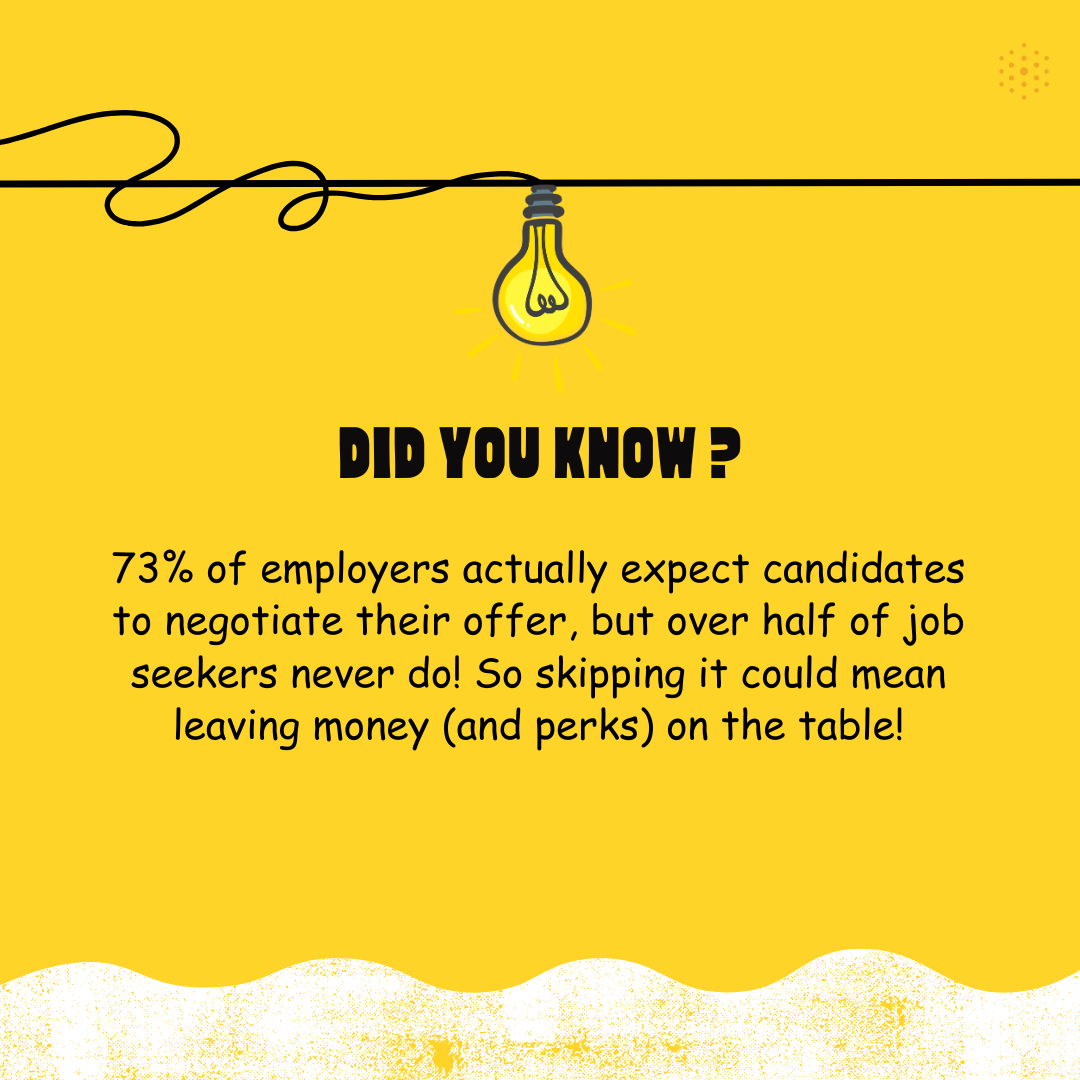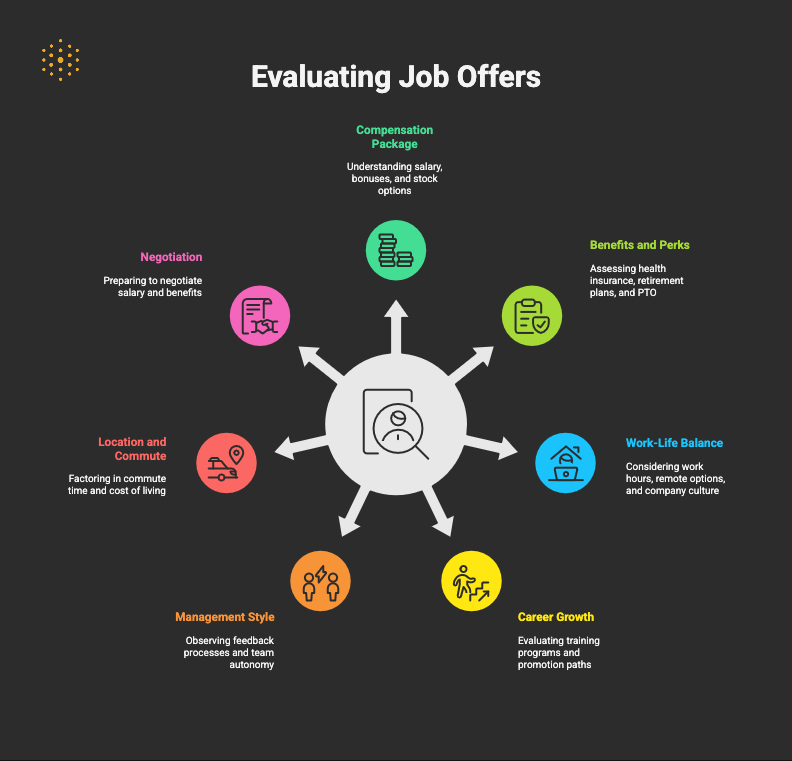What should be considered when evaluating a job offer?
Assess the entire offer, not just salary: total compensation, benefits, schedule flexibility, growth paths, culture and management, and location or commute. Research market pay and negotiate terms; if needs differ, prioritize what impacts daily life.
Landing a job offer is exciting - but before you jump in, it’s worth taking a step back.
A tempting salary or big-name company can overshadow other critical factors that will shape your day-to-day happiness and long-term career growth.
In fact, research shows 79% of people in high-quality jobs report a strong sense of life satisfaction, while that number drops to 32% in poor-quality roles.
Clearly, job quality can outweigh salary when it comes to your well-being.
Here’s a practical checklist to help you look beyond the offer letter and make the best decision for your future.
1. The Full Compensation Picture
Your salary is important, but it's not the only number you should be looking at. The entire compensation package can significantly impact your overall earnings.
- Base Salary: This is the fixed amount you'll earn. Research the average salary for your role and experience level in your geographic location to ensure the offer is competitive.
- Bonuses: Are there performance-based bonuses? Understanding the structure and potential payout is key.
- Commissions: If your role is in sales, the commission structure is a major factor in your earning potential.
- Stock Options: The opportunity to own a piece of the company can be very valuable, especially if the company is growing.
- Raises: Ask about the company's policy on annual raises. Are they based on merit, cost-of-living, or a combination? Some companies don't offer regular raises, so your starting salary could be what you make for a while.
Remember to consider the full picture. A job with a slightly lower base salary but a great bonus structure could end up being more lucrative in the long run.
2. The Benefits and Perks
Benefits and perks can add significant value to your overall compensation package.
Infact surveys show that 28% of employees are looking for better work flexibility and career progression in their next job. This highlights the growing importance of non-salary benefits like:
- Health Insurance: This is a big one. Look at the monthly premium you'll have to pay, the deductible, and what's covered. Does the plan cover just you or your dependents as well?
- Retirement Plans: Does the company offer a 401(k) or other retirement savings plan? Do they offer a company match? A company match is essentially free money, so it's a huge perk.
- Paid Time Off (PTO): How many vacation days, sick days, and personal days do you get? A generous PTO policy can greatly improve your work-life balance.
- Other Perks: Look for other perks that can improve your quality of life, such as gym memberships, transportation allowances, or professional development opportunities.
Also Read: How to find a job you love?

3. Work-Life Balance
Your job shouldn’t consume your entire life. Before saying yes to an offer, make sure the company supports a healthy balance between work and personal time.
- Work Hours: What are the expected work hours? Is there flexibility in your start and end times?
- Remote Work Options: Does the company offer remote or hybrid work options? This can save you time and money on commuting.
- Company Culture: Try to get a sense of the company culture. Do employees seem to work long hours regularly? A company that values and promotes work-life balance will have a more positive and productive environment.
4. Career Growth and Development
Think about your long-term career goals. Does this job offer opportunities for growth and development?
- Training Programs: Does the company offer training programs or subsidize external training?
- Mentorship: Are there mentorship opportunities available?
- Promotion Path: Is there a clear path for advancement within the company?
A job that invests in your professional development can be more valuable than one with a slightly higher starting salary.
5. Management Style and Hierarchy
The way a manager leads can significantly shape your work experience.
- Feedback and Decision-Making: How does the team handle feedback and implement new ideas? Is the environment collaborative or more top-down?
- Team Autonomy: What level of independence do team members have when working on projects? Are decisions centralized or distributed?
These aspects can have a real impact on your day-to-day satisfaction and growth.
Pay attention to how the manager interacts during interviews - supportive leaders tend to listen and encourage questions, while dominant or dismissive behavior could signal micromanagement.
6. Location and Commute
Don't forget to factor in the location and your daily commute.
- Commute Time and Cost: How long will it take you to get to work? How much will it cost in gas or public transportation?
- Cost of Living: If you're relocating for the job, research the cost of living in the new area. A higher salary might not be worth it if the cost of living is significantly higher.
These factors can have a real impact on your daily life and your finances.
Also Read: How to leverage your work experience for career growth?
7. The Art of Negotiation
Finally, don't be afraid to negotiate!
Many people are hesitant to negotiate their salary, but it's a common and expected part of the hiring process.
In fact, a Harvard survey found that about 60% of U.S. workers did not try to negotiate for higher pay when offered a job. That's a lot of money being left on the table.
- Do Your Research: Know your worth. Research the average salary for your position and experience level.
- Be Prepared: Have a clear idea of what you want and be prepared to justify it.
- Negotiate More Than Just Salary: Remember that you can negotiate other aspects of the offer, such as a signing bonus, extra vacation days, or a more flexible work schedule.

Final Thoughts
By taking the time to carefully evaluate the entire job offer package, you can make an informed decision that sets you up for success and happiness in your new role.
And if you want to approach your job search with even more confidence, Hiration can help.
From building an ATS-friendly resume to practicing mock interviews and optimizing your LinkedIn profile, our AI-powered platform helps you stand out and land the right offer - not just any offer.
Frequently Asked Questions
-
What should you evaluate in the full compensation package of a job offer?
Evaluate base salary, bonuses, commissions, stock options, and raises. A job with a slightly lower base salary but a great bonus structure could end up being more lucrative in the long run.
-
What benefits and perks should you review in a job offer?
Review health insurance, retirement plans and company match, PTO, and perks like gym memberships, transportation allowances, or professional development opportunities. Surveys show that 28% of employees are looking for better work flexibility and career progression in their next job.
-
How can work hours and remote options affect work-life balance?
Expected work hours and flexibility shape your daily schedule, and company culture matters. Remote or hybrid work options can save you time and money on commuting.
-
Why should you look beyond salary when evaluating a job offer?
Job quality influences well-being, not just pay. 79% of people in high-quality jobs report a strong sense of life satisfaction, while that number drops to 32% in poor-quality roles.
-
How should you assess career growth and development in an offer?
Look for training programs, mentorship, and a clear promotion path. A job that invests in your professional development can be more valuable than one with a slightly higher starting salary.
-
How do management style and team autonomy influence your decision?
Ask during interviews how the team handles feedback, decision-making, and independence on projects. Supportive leaders tend to listen and encourage questions, while dominant or dismissive behavior could signal micromanagement.
-
How do location, commute, and cost of living affect a job offer’s value?
Estimate commute time and cost, and research local cost of living if relocating. These factors can have a real impact on your daily life and your finances.
-
Should you negotiate a job offer?
Yes, negotiation is a common and expected part of the hiring process. A Harvard survey found that about 60% of U.S. workers did not try to negotiate for higher pay when offered a job.
-
How should you prepare to negotiate a job offer?
Know your worth, research the average salary for your position, and be prepared to justify it. You can negotiate other aspects of the offer such as a signing bonus, extra vacation days, or a more flexible work schedule.
-
Should you ask about annual raises when reviewing an offer?
Yes, ask about the company's policy on annual raises and how they are determined. Some companies don't offer regular raises, so your starting salary could be what you make for a while.



